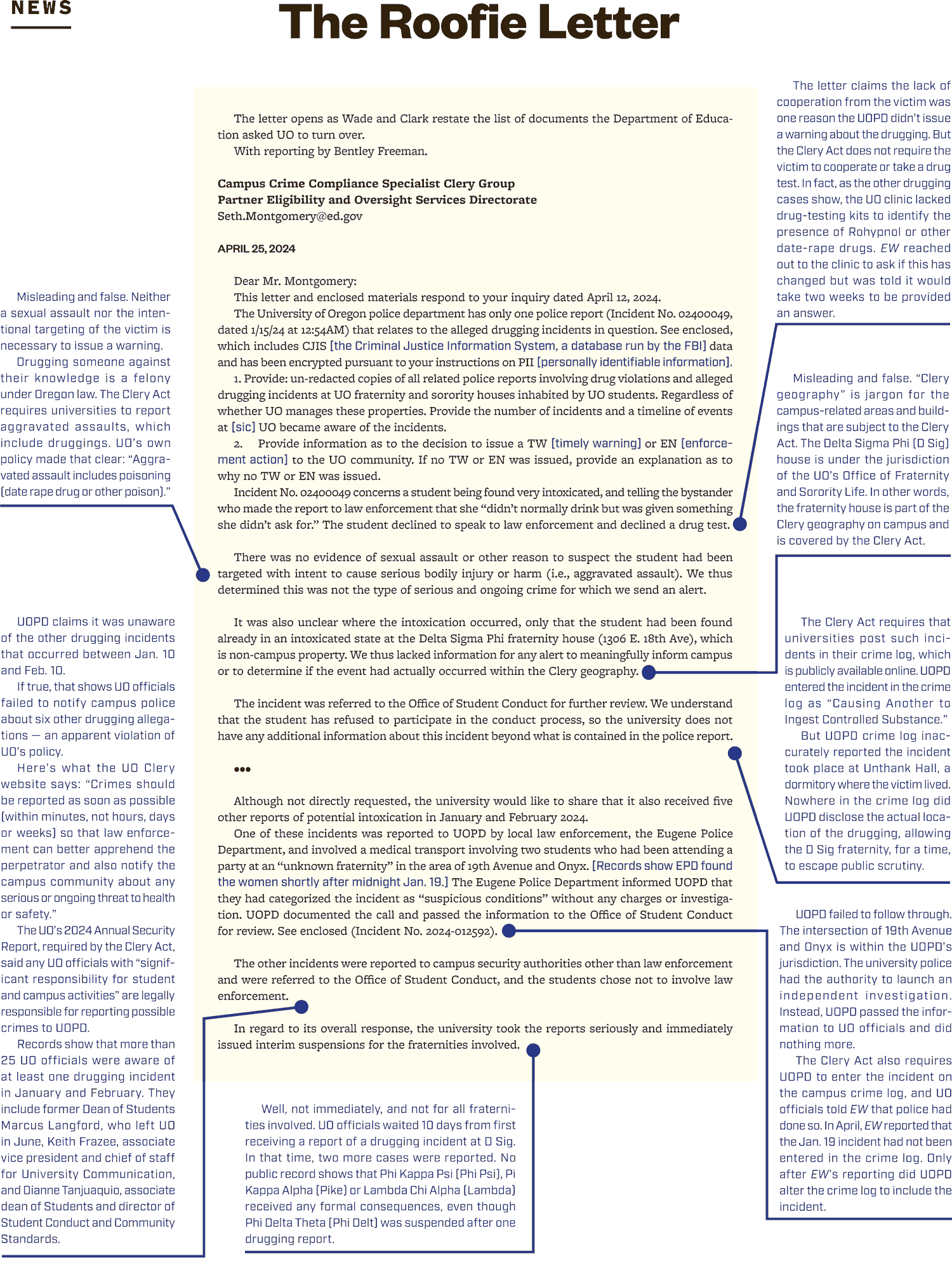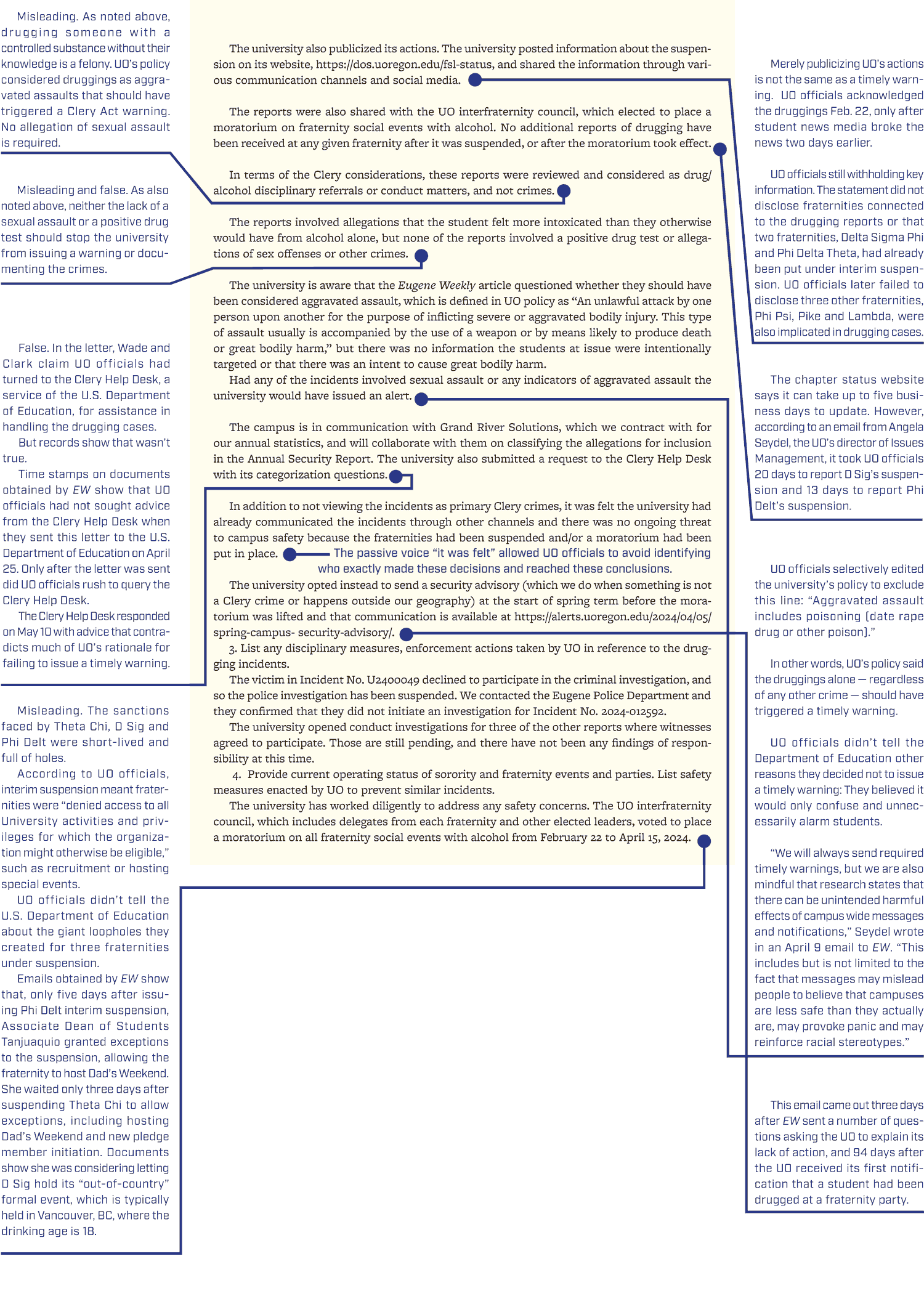This past April, the U.S. Department of Education launched an inquiry into why the University of Oregon had failed to warn students after a rash of druggings at fraternity parties in early 2024.
Druggings are commonly referred to as “getting roofied,” and often target women who are unknowingly given drinks with “date rape” drugs, including sedatives such as Rohypnol (flunitrazepam) or scopolamine.
Druggings are a felony in Oregon, and universities are supposed to report them under a federal law called the Clery Act. The Clery Act requires universities to take certain actions when alerted to druggings and other Clery-designated crimes, and encourages campus officials to send out safety warnings.
University officials learned of six druggings at fraternity parties over a six-week period in January and February. The UOPD knew of at least two cases. Other university officials knew of four others but never bothered to alert the police, effectively preventing UO from issuing a warning to students.
That’s why the U.S. Department of Education, which investigates violations of the Clery Act, has come knocking.
The federal inquiry launched on April 12, one day after Eugene Weekly reported in “F is for Failure” that UO officials had initially concealed the druggings and later issued misleading and false statements about the UO’s failure to send out timely warnings.
The inquiry came from Seth Montgomery, a campus crime compliance specialist with the U.S. Department of Education. Montgomery posed several questions and asked for documents from the UOPD.
UO officials could have used the opportunity to come clean to the U.S. Department of Education about why they concealed the druggings and failed to issue timely warnings.
But they didn’t.
Using the Oregon public records law, EW has obtained the UO’s response to the Department of Education’s initial inquiry. Dated April 25, the response came from UO Police Chief Jason Wade and Shelly Clark, UO’s Clery coordinator. Wade and Clark argued that UO took appropriate steps to prevent further druggings — even though the druggings amounted to criminal poisonings under state law.
But the UO’s response to the Department of Education inquiry extended the misleading narrative about why officials failed to warn students about the pattern of druggings.
UO officials declined to answer EW’s questions about the April 25 letter.
EW is reprinting the full text of the UO’s response, along with annotations that show where the university failed to provide complete, accurate or truthful answers to the federal inquiry.
The letter opens as Wade and Clark restate the list of documents the Department of Education asked UO to turn over.


Campus Crime Compliance Specialist Clery Group
Partner Eligibility and Oversight Services Directorate
Seth.Montgomery@ed.gov
April 25, 2024
Dear Mr. Montgomery:
This letter and enclosed materials respond to your inquiry dated April 12, 2024.
1. Provide: un-redacted copies of all related police reports involving drug violations and alleged drugging incidents at UO fraternity and sorority houses inhabited by UO students. Regardless of whether UO manages these properties. Provide the number of incidents and a timeline of events at [sic] UO became aware of the incidents.
The University of Oregon police department has only one police report (Incident No. 02400049, dated 1/15/24 at 12:54AM) that relates to the alleged drugging incidents in question. See enclosed, which includes CJIS [the Criminal Justice Information System, a database run by the FBI] data and has been encrypted pursuant to your instructions on PII [personally identifiable information].
2. Provide information as to the decision to issue a TW [timely warning] or EN [enforcement action] to the UO community. If no TW or EN was issued, provide an explanation as to why no TW or EN was issued.
Incident No. 02400049 concerns a student being found very intoxicated, and telling the bystander who made the report to law enforcement that she “didn’t normally drink but was given something she didn’t ask for.” The student declined to speak to law enforcement and declined a drug test.
The letter claims the lack of cooperation from the victim was one reason the UOPD didn’t issue a warning about the drugging. But the Clery Act does not require the victim to cooperate or take a drug test. In fact, as the other drugging cases show, the UO clinic lacked drug-testing kits to identify the presence of Rohypnol or other date-rape drugs. EW reached out to the clinic to ask if this has changed but was told it would take two weeks to be provided an answer.
There was no evidence of sexual assault or other reason to suspect the student had been targeted with intent to cause serious bodily injury or harm (i.e., aggravated assault). We thus determined this was not the type of serious and ongoing crime for which we send an alert.
Misleading and false. Neither a sexual assault nor the intentional targeting of the victim is necessary to issue a warning.
It was also unclear where the intoxication occurred, only that the student had been found already in an intoxicated state at the Delta Sigma Phi fraternity house (1306 E. 18th Ave), which is non-campus property. We thus lacked information for any alert to meaningfully inform campus or to determine if the event had actually occurred within the Clery geography.
Misleading and false. “Clery geography” is jargon for the campus-related areas and buildings that are subject to the Clery Act. The Delta Sigma Phi (D Sig) house is under the jurisdiction of the UO’s Office of Fraternity and Sorority Life. In other words, the fraternity house is part of the Clery geography on campus and is covered by the Clery Act.
The incident was referred to the Office of Student Conduct for further review. We understand that the student has refused to participate in the conduct process, so the university does not have any additional information about this incident beyond what is contained in the police report.
The Clery Act requires that universities post such incidents in their crime log, which is publicly available online. UOPD entered the incident in the crime log as “Causing Another to Ingest Controlled Substance.”
***
Although not directly requested, the university would like to share that it also received five other reports of potential intoxication in January and February 2024.
One of these incidents was reported to UOPD by local law enforcement, the Eugene Police Department, and involved a medical transport involving two students who had been attending a party at an “unknown fraternity” in the area of 19th Avenue and Onyx. [Records show EPD found the women shortly after midnight Jan. 19.] The Eugene Police Department informed UOPD that they had categorized the incident as “suspicious conditions” without any charges or investigation. UOPD documented the call and passed the information to the Office of Student Conduct for review. See enclosed (Incident No. 2024-012592).
UOPD failed to follow through. The intersection of 19th Avenue and Onyx is within the UOPD’s jurisdiction. The university police had the authority to launch an independent investigation. Instead, UOPD passed the information to UO officials and did nothing more.
The other incidents were reported to campus security authorities other than law enforcement and were referred to the Office of Student Conduct, and the students chose not to involve law enforcement.
UOPD claims it was unaware of the other drugging incidents that occurred between Jan. 10 and Feb. 10.
In regard to its overall response, the university took the reports seriously and immediately issued interim suspensions for the fraternities involved.
Well, not immediately, and not for all fraternities involved. UO officials waited 10 days from first receiving a report of a drugging incident at D Sig. In that time, two more cases were reported. No public record shows that Phi Kappa Psi (Phi Psi), Pi Kappa Alpha (Pike) or Lambda Chi Alpha (Lambda) received any formal consequences, even though Phi Delta Theta (Phi Delt) was suspended after one drugging report.
The university also publicized its actions. The university posted information about the suspension on its website, https://dos.uoregon.edu/fsl-status, and shared the information through various communication channels and social media.
Merely publicizing UO’s actions is not the same as a timely warning. UO officials acknowledged the druggings Feb. 22, only after student news media broke the news two days earlier.
The reports were also shared with the UO interfraternity council, which elected to place a moratorium on fraternity social events with alcohol. No additional reports of drugging have been received at any given fraternity after it was suspended, or after the moratorium took effect.
The chapter status website says it can take up to five business days to update. However, according to an email from Angela Seydel, the UO’s director of Issues Management, it took UO officials 20 days to report D Sig’s suspension and 13 days to report Phi Delt’s suspension.
In terms of the Clery considerations, these reports were reviewed and considered as drug/alcohol disciplinary referrals or conduct matters, and not crimes.
Misleading. As noted above, drugging someone with a controlled substance without their knowledge is a felony. UO’s policy considered druggings as aggravated assaults that should have triggered a Clery Act warning. No allegation of sexual assault is required.
The reports involved allegations that the student felt more intoxicated than they otherwise would have from alcohol alone, but none of the reports involved a positive drug test or allegations of sex offenses or other crimes.
Misleading and false. As also noted above, neither the lack of a sexual assault or a positive drug test should stop the university from issuing a warning or documenting the crimes.
The university is aware that the Eugene Weekly article questioned whether they should have been considered aggravated assault, which is defined in UO policy as “An unlawful attack by one person upon another for the purpose of inflicting severe or aggravated bodily injury. This type of assault usually is accompanied by the use of a weapon or by means likely to produce death or great bodily harm,” but there was no information the students at issue were intentionally targeted or that there was an intent to cause great bodily harm.
Had any of the incidents involved sexual assault or any indicators of aggravated assault the university would have issued an alert.
UO officials selectively edited the university’s policy to exclude this line: “Aggravated assault includes poisoning (date rape drug or other poison).”
The campus is in communication with Grand River Solutions, which we contract with for our annual statistics, and will collaborate with them on classifying the allegations for inclusion in the Annual Security Report. The university also submitted a request to the Clery Help Desk with its categorization questions.
False. In the letter, Wade and Clark claim UO officials had turned to the Clery Help Desk, a service of the U.S. Department of Education, for assistance in handling the drugging cases.
The passive voice “it was felt” allowed UO officials to avoid identifying who exactly made these decisions and reached these conclusions.
The university opted instead to send a security advisory (which we do when something is not a Clery crime or happens outside our geography) at the start of spring term before the moratorium was lifted and that communication is available at https://alerts.uoregon.edu/2024/04/05/spring-campus- security-advisory/.
This email came out three days after EW sent a number of questions asking the UO to explain its lack of action, and 94 days after the UO received its first notification that a student had been drugged at a fraternity party.
3. List any disciplinary measures, enforcement actions taken by UO in reference to the drugging incidents.
The victim in Incident No. U2400049 declined to participate in the criminal investigation, and so the police investigation has been suspended. We contacted the Eugene Police Department and they confirmed that they did not initiate an investigation for Incident No. 2024-012592.
The university opened conduct investigations for three of the other reports where witnesses agreed to participate. Those are still pending, and there have not been any findings of responsibility at this time.
4. Provide current operating status of sorority and fraternity events and parties. List safety measures enacted by UO to prevent similar incidents.
The university has worked diligently to address any safety concerns. The UO interfraternity council, which includes delegates from each fraternity and other elected leaders, voted to place a moratorium on all fraternity social events with alcohol from February 22 to April 15, 2024.
Misleading. The sanctions faced by Theta Chi, D Sig and Phi Delt were short-lived and full of holes.
The letter ends after describing additional safety measures the UO took, including safety and wellness training for Greek chapters. The letter also states that the Office of Safety and Risk Services sent out a spring security notice that included information about the reports. (UO sent the notice 94 days after receiving its first notification that a student had been drugged at a fraternity party.)
UO officials tell EW that they realized they didn’t handle the wave of druggings as well as they should have. Eric Howald, assistant director of Issues Management, says that EW’s earlier coverage helped prompt improvements.
“We believe that the reporting and some of the questions generated helped to improve our processes and pointed out ways that we could better inform our community about important and critical safety issues like this,” Howald writes in an email.
Among the changes that Howald cites:
UO officials intend to be “more proactive” when receiving reports of druggings. Howald says officials have improved internal communications, even with only partial information, to identify potential threats better and act quickly. He also says the UO’s Clery coordinator will be notified of every report of a drugging “even if it is not reported as a crime.” Howald also says fraternities have pledged to improve security at events, including standard guest lists, training for new members on party safety and alcohol use, and providing sober monitors.
This fall, UO issued two timely warnings regarding druggings at fraternity parties.
With reporting by Bentley Freeman.
